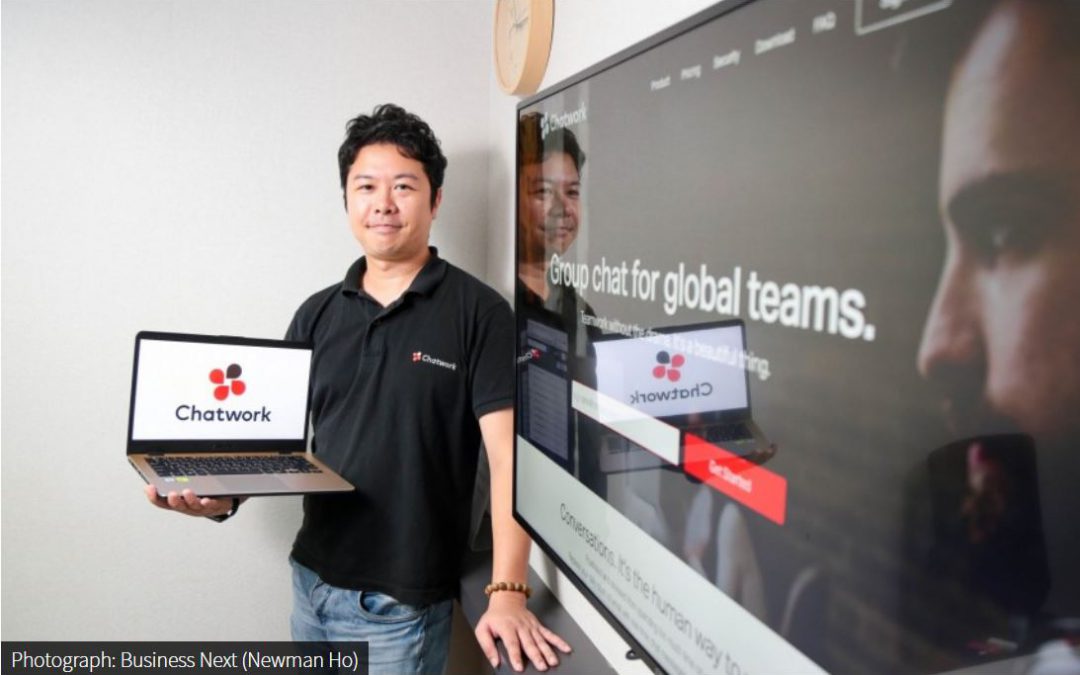Business chat tool Chatwork, after Tokyo IPO, looks to grow footprint in Taiwan and Asia

Chatwork, having secured a dominant market share (70%)* in Japan, arrived at Taiwan three years ago as its first attempt to expand the software business overseas.
Launched in 2011, the Japanese company develops a namesake instant messaging app for businesses with less than 300 employees. Users can not only send messages to each other but also manage tasks, share files, and make video calls. Unlike its major competitor Slack, it’s a people-centric platform that allows them to create and be added into groups as on Facebook.
Business Next had talked with the general manager of the Taiwan branch Masafumi Kawamura back in 2016, more than one year after the parent company welcomed an influx of third-party capital: ¥300M ($3M) from GMO Venture Partners and ¥1.5B ($15M) from GMO Venture Partners, SHINSEI, JAFCO, and SMBC Venture Capital, all of which are from Japan.
This year, Chatwork has got nod of approval for initial public offering (IPO) at the Tokyo Stock Exchange (TSE) in September. Its shares are listed and traded on Mothers, a TSE section for startups.
CFO Naoki Inoue told us that going public may strengthen the company’s presence in the global market and help them build trust with clients, and these two benefits are mutually reinforcing.
The trust from clients is particularly crucial for an messaging app like Chatwork as it involves the issue of privacy. “Our mission is to ensure that our communication platform is one that users feel safe while using,” he explained.
Following its well-supported IPO, the goal for the firm has been clear enough: besides 90% of the efforts in Japan, it expects to grow footprint in other Asian countries, according to TechCrunch. And they are, for now, Taiwan and Vietnam.
The Vietnam branch was founded in 2016 as well, when the company saw increasing number of Japanese businesses offshore jobs in one of the most fast-growing countries in Southeast Asia.
Mr. Inoue said It’s only after reaching “great success” in Asia will Chatwork proceed to Western markets including Europe and the US, in which the office had been temporarily shut down to ensure a smooth IPO; the marketing plan in the US wasn’t finalized despite five years of exploration. He defined such success as the time when Chatwork app sees high demand and its user base grows steadily.
Chatwork’s three-year journey in Taiwan
Mr. Kawamura, GM of the Taiwan branch, pointed out that while the clients in Japan are predominantly law and accounting firms, the majority of the users in Taiwan are employees from civil engineering and manufacturing companies, who pay Chatwork for the software service. The app can be used for the communication between factory workers and product designers, for instance.
The company has also started to see university clients employ its service in Taiwan to facilitate the communication between professors and students who work together at labs, as in Japan, where it has collaborated with some at Kyoto University.
Speaking of startups as a new target audience, Mr. Kawamura said the team hasn’t had the plan to reach out to this new group of clients. “But we are still interested in newly-established businesses from traditional industries,” he added.
He believes Slack, as a tool designed at first for IT developers, may suit a large proportion of startups in Taiwan as most of them are tech companies.
Meanwhile, ChatWork has been localizing their product to create positive user experience and thus discovered some needs specific to Taiwan. For example, Mr. Kawamura said Taiwanese companies tend to ask to remove the function that enables users to edit and delete messages after posting them in the chatroom — one that is often desirable for their Japanese counterparts.
When asked about the biggest difference between corporate clients in these two countries, Mr. Kawamura said, with a chuckle, those in Taiwan make decisions more quickly. He now drops in on companies that have been utilizing ChatWork’s service for free, persuading them to pay to enjoy advanced functions and services.
Reference: 1/2/3
*Source: Research by Fuji Chimera Research Institute, Inc. in 2015.
〔Original :Meet Startup @ TW〕
https://meet.bnext.com.tw/intl/articles/view/45622